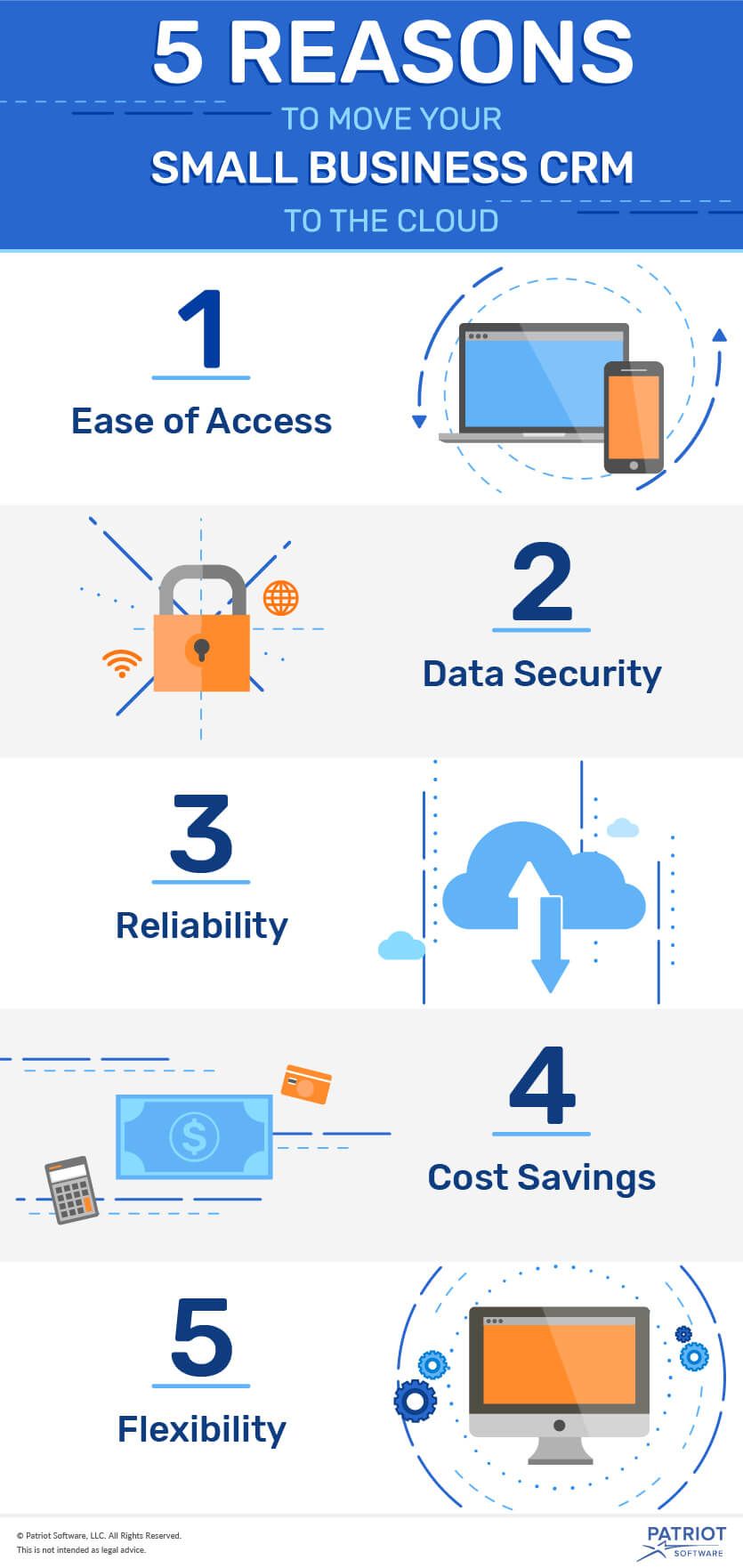Software tools for customer relationship management (CRM) can help your small business provide excellent customer service while improving your operational efficiency. As you build close relationships with your customers, you’ll increase the amount of repeat business you get and thereby reduce the average cost of every sale. In the end, CRM systems for small business can increase the value of your brand and the profitability of your company.
Cloud technology has made CRM even more efficient, giving your company capabilities that you never thought were possible. When you choose cloud-based CRM for small business, you get all the benefits of the cloud while improving the security, accessibility, and affordability of your software. The following five reasons will help you understand why you should migrate your CRM to the cloud.
Ease of access
Accessibility is a great advantage companies that choose the cloud have over their traditional competitors. Cloud CRM applications work through web browsers and mobile apps, giving you the opportunity to add mobile and remote employees to your payroll. For example, cloud-based recruiting CRM software would allow team members of a recruitment agency to collaborate from any location. As long as your workers can access the internet, they can collaborate on tasks and communicate with customers as though they were in the office.
You and your team can also access your cloud-based CRM after hours, making it possible to address urgent problems immediately without going back to the office. The cloud enables you to offer your customers secure and continuous access to self-service and help desk functions.
Data security
New headlines routinely tell the story of the havoc hackers bring to the business world. Large and small companies experience embarrassing setbacks when their customers’ data becomes compromised and their trade secrets become common knowledge.
Cloud CRM products allow you to enjoy unprecedented security without needing to expand your payroll or your IT inventory. As long as you research the company that will handle your customer data and make sure their policies comply with ISO 27001 security standards, you shouldn’t worry about the safety of your data.
Your company might not have the resources to invest in the personnel and equipment required to secure your network and applications and stay alert to new threats. Cloud CRM providers understand the importance of security and have ample resources to employ the ultimate systems and expertise to resist intrusions. State-of-the-art monitoring systems, firewalls, and end-to-end encryption are just a few examples of the technologies used to secure your cloud-based CRM.
Additionally, when you move your small business CRM to the cloud, you’ll have the ability to set user permissions to allow your employees access only to the information needed to fill their role. You can also require team members to use strong passwords and periodically change their login credentials. However, you will need to make sure that your employees never access the CRM via public Wi-Fi as it is insecure and increases the risk of data breaches.
Reliability
In the past, businesses were at the mercy of on-premise systems that were vulnerable to failure. Large companies were able to buy expensive redundant systems to increase their survivability in the event of a crash, but small and mid-sized operations sometimes experienced unacceptable downtime and data loss. Cloud CRM changed that.
Economies of scale empower cloud service providers to provide exceptional levels of service. Redundant servers and automated backups ensure that your team and customers can depend on having access to your CRM whenever they need it. You might discover that the reliability of the cloud is one of its strongest selling points.
Cost savings of a small business CRM
The cloud-based CRM software that you use runs on your provider’s servers and loads in employees’ web browsers and mobile devices. The software runs on practically any machine, so you don’t have to worry about continually replacing obsolete workstations. Additionally, your CRM provider maintains the software, so you don’t need to worry about installing software updates and bug fixes.
Also, rather than paying a high up-front price for your software, your cloud-based software provider bills monthly, so you have a predictable line item for your budget. For example, Patriot Software offers affordable online accounting and payroll software that is billed month-to-month. You only pay for the number users, services, and features you need, so your software can scale with your business’s needs.
Without the need to pay for software maintenance or additional hardware, you can cut costs by moving your CRM to the cloud. In fact, according to surveys, 88% of businesses that have moved to the cloud reported that they noticed significant cost savings.
Flexibility
Moving your CRM to the cloud gives you the flexibility to add and remove features and users without needing to invest in additional IT infrastructure. As your company evolves, its needs might change. Cloud CRM can change with your needs.
Regardless of whether you need additional bandwidth or only need to add or remove users, you can make most of the changes you need from your CRM’s control panel and dashboard. Even if your company moves, or if you change to a different operational mode, your company can continuously operate.

Final thoughts on choosing a cloud-based CRM for small business
You might, at first, wonder whether your company can benefit by moving your CRM to the cloud. Now that you understand the above five reasons that support such a move, you can begin shopping for the CRM that has the features and services you need. When your company can work smarter and faster to serve your customers, you’ll build better relationships and a stronger bottom line.
These views are made solely by the author.



